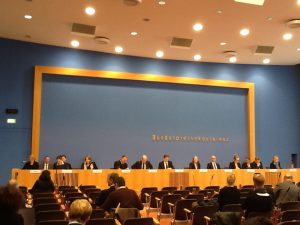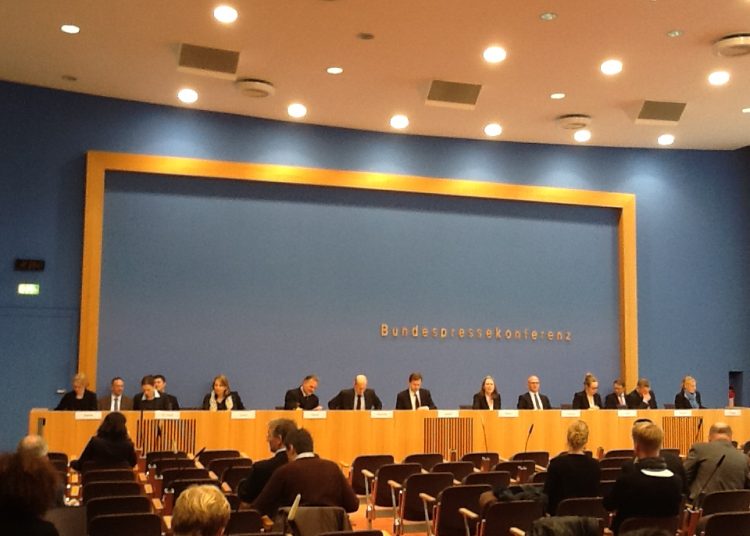By Intissar K. Rajabany.

Tripoli, 2 February:
Last year I visited Berlin at the invitation of the Federal Foreign Office as part of a . . .[restrict]programme entitled “Democracy and the role of women in the Middle East” which included female professionals and activists from a number of countries in the MENA region.
The one week visit was designed to cover numerous aspects of the way to more equal treatment of women and how this was experienced in Germany before and after reunification and what could be drawn from it in light of our experience.
I found the visit went beyond gender equality in the strict sense of the term as it included useful and practical information on varied aspects of how other cultures have handled rebuilding, dictatorship legacy, rule of law, job creation and a host of instruments which could be emulated and adapted to our part of the world as tried and tested.
One aspect of the programme made a lasting impact; it was our visit to the Federal Press Conference or “Die Bundespressekonferenz” (BKP) as the Germans call it.
Though this press corps was founded in 1949 it was a tradition running back to the Weimar Republic. A separate body from that of the Federal Press Office, the BKP is a registered association financed by the subscriptions of its members and open to German media members and those from the Association of Foreign Press who all must be reporting from Germany. So they actually have to be in town which is a very important aspect of reporting facts!
Although the BKP is a government press conference, it is therefore totally dissociated from the government and has separate rented premises for its offices and the main hall. The press conferences are organized 3 times a week, on Monday, Wednesday and Friday with leading representatives from politics, economy, culture, health etc. Most importantly, it is the BKP which decides who will provide which information on which topic. During the allocated time the government spokesperson and designated spokespersons of the ministries field questions by journalists under the direction of a chair member of BKP.
To me this was like watching a dream come true. With my rudimentary German I followed avidly the mechanism of how the press conference was handled and the back and forth discussion and banter between journalists and the 14 government representatives; what was communicated and what was left unsaid. Prior to this day I had no clear idea of how this body worked though I was an occasional follower of German media. But upon entering the modern, well equipped and well lit hall, where many mundane public issues but also critical ones are announced and clarified, I felt doubly privileged knowing that this was an exclusive area to members but that “guests may be permitted under exceptional circumstances”.
Here was a practical tool that could be implemented back home. “Why did we not think about this? “ I thought. It reminded me of how I had been advocating a year ago for the need for coordinated communication from our government whether transitional or elected. In a previous article discussing the future constitution of Libya I spoke about Communication as being the pillar of a successful constitution process and hence democracy.
We have seen throughout the past year how much media has played a role in Libyan life and that much criticism can be leveled at our own media which lacks so much and which is allegedly riddled with private, personal and foreign agendas. However, they must be saluted for the efforts deployed to provide some sense of what is going on in Libya despite the poor distribution of information from the government and four decades of totalitarian rule.
The media plays a central role in a democracy by acting as an intermediary between the government, and the general public. Keeping people informed helps to shape public opinion but also hold public officials accountable. This is why it is so important that the media be kept thoroughly informed of government activities.
To give its due, the El Kib interim government had initiated a weekly press conference in the first half of 2012, where the press would converge on the seat of government building in Sikka Road, Tripoli to listen to what the spokesperson or sometimes even the PM himself had to say. But it has not been always regular or on time or properly moderated. Obviously the government has so much information to share and finding an effective way to distribute it is a priority.
I would like to propose that while we wait for the government to update its communication strategy and department, and while we wait for the e-government to start to function (and both will take a while), and before we revamp and modernise the press office of the government to be able to play this seminal role – we should look into establishing a privately funded body like the BKP and use the German model.
It has a formal yet flexible structure that is suitable for the Libyan culture. It has the elements of exclusivity to members which would guarantee to stroke the Libyan ego and because it is a paid service, member organisations or free lancers will make sure to dispatch their representatives to get the freshly minted information from the government.
At the last count we had “about 500 registered newspapers and magazines and over 20 private and public TV stations” in Arabic, Amazign and English. So there should be no shortage of applications to subscribe. I’m also certain that the foreign media correspondents and press officers of foreign embassies stationed in Libya would jump at this opportunity. TV crews could film and broadcast tidbits in the news, journalists will have material to write and the public will enjoy varied and regular information.
Agendas would not matter because of the checks and balances with the presence of so many journalists and spokespeople. It should be a sustainable project that would greatly improve the dialogue and generate not just news but conversations between the various journalists Libyan and foreign. It would allow more opportunity to improve on professionalism maybe also feedback into interesting book publication and best practice. Certainly it has numerous advantages including the one of public service transparency, which was a heavily criticized shortcoming from the time of the NTC till today.
We won’t need to send many delegations to Berlin to determine how exactly the BKP is structured. Surely if we write to them they would be happy to oblige and share their experience?
For the more practical side of the operation, dispatching someone to shadow a member of staff at the BKP in Berlin would be very useful. We could either rent the premises or have one built for purpose at a recognizable location in Tripoli. The possibilities are endless but it would create a much needed platform with a role to provide information that is as comprehensive as possible to the media and hence to the public at large.
“Let the people know the facts, and the country will be safe”, said Abraham Lincoln America’s president in 1864. This still holds true.
Intissar K. Rajabany holds an MA in International Relations Theory from the University of Warwick. Her main interests are human rights, women empowerment in governance, Political Islam and security studies.
The opinions expressed are solely those of the author and do not reflect those of the Libya Herald or any other entity or individual.
[/restrict]





